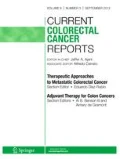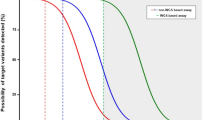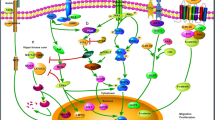Abstract
Colorectal cancer (CRC) is a leading cause of cancer-related death in the Western world. Early stage CRC is potentially curable by surgery alone, but about 40% of these patients will develop recurrent disease. In stage III CRC, a survival benefit has been demonstrated for adjuvant 5-fluorouracil-based chemotherapy, but the role of adjuvant chemotherapy in stage II CRC is less well defined. There is, therefore, a need to identify those patients with early stage CRC who are most at risk of developing recurrent disease and would derive most benefit from adjuvant therapy. New high-throughput technologies such as microarray-based gene expression profiling have enabled the identification of panels of markers predictive of recurrence; these have been the subject of a number of studies performed in early stage CRC. This review discusses both these studies and the “classic” prognostic biomarkers in CRC, including the potential use of such markers in prospective studies.
Similar content being viewed by others
References and Recommended Reading
Weitz J, Koch M, Debus J, et al.: Colorectal cancer. Lancet 2005, 365:153–165.
Moertel CG, Fleming TR, Macdonald JS, et al.: Levamisole and fluorouracil for adjuvant therapy of resected colon carcinoma. N Engl J Med 1990, 322:352–358.
Benson AB III, Schrag D, Somerfield MR, et al.: American Society of Clinical Oncology recommendations on adjuvant chemotherapy for stage II colon cancer. J Clin Oncol 2004, 22:3408–3419.
Andre T, Boni C, Mounedji-Boudiaf L, et al.: Oxaliplatin, fluorouracil, and leucovorin as adjuvant treatment for colon cancer. N Engl J Med 2004, 350:2343–2351.
Vogelstein B, Fearon ER, Hamilton SR, et al.: Genetic alterations during colorectal tumor development. N Engl J Med 1988, 319:525–532.
Lengauer C, Kinzler KW, Vogelstein B: Genetic instabilities in human cancers. Nature 1998, 396:643–649.
Knuutila S, Bjorkqvist AM, Autio K, et al.: DNA copy number amplification in human enoplasms: review of comparative genomic hybridization studies. Am J Pathol 1998, 152:1107–1123.
McLeod HL, Murray GI: Tumour markers of prognosis in colorectal cancer. Br J Cancer 1999, 79:191–203.
Ogunbiyi OA, Goodfellow PJ, Herfarth K, et al.: Confirmation that chromosome 18q allelic loss in colon cancer is a prognostic indicator. J Clin Oncol 1998, 16:427–433.
Andersen SN, Lovig T, Breivik J, et al.: K-ras mutations and prognosis in large bowel carcinomas. Scand J Gastroenterol 1997, 32:62–69.
Ahnen DJ, Feigl P, Quan G, et al.: Ki-ras mutation and p53 overexpression predict the clinical behavior of colorectal cancer: a Southwest Oncology Group study. Cancer Res 1998, 58:1149–1158.
Smith DR, Ji CY, Goh HS: Prognostic significance of p53 overexpression and mutation in colorectal adenocarcinomas. Br J Cancer 1996, 74:216–223.
Kaklamanis L, Savage A, Whitehouse R, et al.: Bcl-2 protein expression: association with p53 and prognosis in colorectal cancer. Br J Cancer 1998, 77:1864–1869.
Elsaleh H, Soontrapornchai P, Grieu F, et al.: p53 alterations have no prognostic or predictive significance in Dukes’ C rectal carcinomas. Int J Oncol 1999, 15:1239–1243.
Liu B, Parsons R, Papadopoulos N, et al.: Analysis of mismatch repair genes in hereditary non-polyposis colorectal cancer patients. Nat Med 1996, 2:169–174.
Elsaleh H, Iacopetta B: Microsatellite instability is a predictive marker for survival benefit from adjuvant chemotherapy in a population-based series of stage III colorectal carcinoma. Clin Colorectal Cancer 2001, 2:104–109.
Lim SB, Jeong SY, Lee MR, et al.: Prognostic significance of microsatellite instability in sporadic colorectal cancer. Int J Colorectal Dis 2004, 19:533–537.
Wang C, van Rijnsoever M, Grieu F, et al.: Prognostic significance of microsatellite instability and Ki-ras mutation type in stage II colorectal cancer. Oncology 2003, 64:259–265.
Ribic CM, Sargent DJ, Moore MJ: Tumor microsatellite-instability status as a predictor of benefit from fluorouracil-based adjuvant chemotherapy for colon cancer. N Engl J Med 2003, 349:247–257.
Watanabe T, Wu TT, Catalano PJ, et al.: Molecular predictors of survival after adjuvant chemotherapy for colon cancer. N Engl J Med 2001, 344:1196–1206.
Benson AB 3rd: New approaches to the adjuvant therapy of colon cancer. Oncologist 2006, 11:973–980.
Houghton JA, Tillman DM, Harwood FG, et al.: Ratio of 2′-deoxyadenosine-5′-triphosphate/thymidine-5′-triphosphate influences the commitment of human colon carcinoma cells to thymineless death. Clin Cancer Res 1995, 1:723–730.
Longley DB, Harkin DP, Johnston PG: 5-Fluorouracil: mechanisms of action and clinical strategies. Nat Rev Cancer 2003, 3:330–338.
Lenz HJ, Danenberg KD, Leichman CG, et al.: p53 and thymidylate synthase expression in untreated stage II colon cancer: associations with recurrence, survival and site. Clin Cancer Res 1998, 4:1227–1234.
Johnston PG, Fisher ER, Rockette HE, et al.: The role of thymidylate synthase expression in prognosis and outcome of adjuvant chemotherapy in patients with rectal cancer. J Clin Oncol 1994, 12:2640–2647.
Yamachika T, Nakanishi H, Inada K, et al.: A new prognostic factor for colorectal carcinoma, thymidylate synthase, and its therapeutic significance. Cancer 1998, 82:70–77.
Edler D, Kressner U, Ragnhammmar P, et al.: Immunohistochemically detected thymidylate synthase in colorectal cancer: an independent prognostic factor of survival. Clin Cancer Res 2000, 6:488–492.
Edler D, Blomgren H, Allegra CJ, et al.: Immunohistological determination of thymidylate synthase in colorectal cancer—methodological studies. Eur J Cancer 1997, 33:2278–2281.
Johnston PG, Lenz HJ, Leichman CG, et al.: Thymidylate synthase gene and protein expression correlate and are associated with response to 5-fluorouracil in human colorectal and gastric tumors. Cancer Res 1995, 55:1407–1412.
Leichman CG, Lenz HJ, Leichman L, et al.: Quantitation of intratumoural thymidylate synthase expression predicts for disseminated colorectal cancer response and resistance to protracted-infusion fluorouracil and weekly leucovorin. J Clin Oncol 1997, 15:3223–3229.
Davies MM, Johnston PG, Kaur S, et al.: Colorectal liver metastasis thymidylate synthase staining correlates with response to hepatic arterial floxuridine. Clin Cancer Res 1999, 5:325–328.
Aschele C, Debernardis D, Casazza S, et al.: Immunohistochemical quantitation of thymidylate synthase expression in colorectal cancer metastases predicts for clinical outcome to fluorouracil-based chemotherapy. J Clin Oncol 1999, 17:1760–1770.
Johnston PG, Benson A, Catalano P, et al.: The clinical significance of thymidylate synthase (TS) expression in primary colorectal cancer: an intergroup combined analysis [abstract]. J Clin Oncol (ASCO Annual Meeting Proceedings) 2005, 23:Abstract 3510.
Diasio RB, Harris BE: Clinical pharmacology of 5-fluorouracil. Clin Pharmacokinet 1989, 16:215–237.
Tsuji T, Sawai T, Takeshita H, et al.: Tumor dihydropyrimidine dehydrogenase expression is a useful marker in adjuvant therapy with oral fluoropyrimidines after curative resection of colorectal cancer. Cancer Chemother Pharmacol 2004, 54:531–536.
Oi K, Makino M, Ozaki M, et al.: Immunohistochemical dihydropyrimidine dehydrogenase expression is a good prognostic indicator for patients with Dukes’ C colorectal cancer. Anticancer Res 2004, 24:273–279.
Nishimura G, Terada I, Kobayashi T, et al.: Thymidine phosphorylase and dihydropyrimidine dehydrogenase levels in primary colorectal cancer show a relationship to clinical effects of 5′-deoxy-5-fluorouridine as adjuvant chemotherapy. Oncol Rep 2002, 9:479–482.
Salonga D, Danenberg K, Johnson M, et al.: Colorectal tumors responding to 5-fluorouracil have low gene expression levels of dihydropyrimidine dehydrogenase, thymidylate synthase, and thymidine phosphorylase. Clin Cancer Res 2000, 6:1322–1327.
Wang Y, Jatkoe T, Zhang Y, et al.: Gene expression profiles and molecular markers to predict recurrence of Dukes’ B colorectal cancer. J Clin Oncol 2004, 22:1564–1571.
Eschrich S, Yang I, Bloom G, et al.: Molecular staging for survival prediction of colorectal cancer patients. J Clin Oncol 2005, 23:3526–3535.
Barrier A, Lemoine A, Boelle PY, et al.: Colon cancer prognosis prediction by gene expression profiling. Oncogene 2005, 24:6155–6164.
Barrier A, Boelle PY, Roser F, et al.: Stage II colon cancer prognosis prediction by tumor gene expression profiling. J Clin Oncol 2006, 24:4685–4691.
Johnston PG, Mulligan K, Kay E, et al.: A genetic signature of relapse in stage II colorectal cancer derived from formalin fixed paraffin embedded tissue (FFPE) tissue using a unique disease specific colorectal array [abstract]. J Clin Oncol (ASCO Annual Meeting Proceedings) 2006, 24:Abstract 3519.
van de Vijver MJ, He YD, van’t Veer LJ, et al.: A gene expression signature as a predictor of survival in breast cancer. N Engl J Med 2002, 347:1999–2009.
van’t Veer LJ, Dai H, van de Vijver MJ, et al.: Gene expression profiling predicts clinical outcome of breast cancer. Nature 2002, 415:530–536.
Paik S, Shak S, Tang G, et al.: A multi-gene assay to predict recurrence of tamoxifen-treated node-negative breast cancer. N Engl J Med 2004, 351:2817–2826.
Paik S, Sahk S, Tang G, et al.: Gene expression and benefit of chemotherapy in women with node-negative, estrogen-receptor-positive breast cancer. J Clin Oncol 2006, 24:3726–3734.
Author information
Authors and Affiliations
Corresponding author
Rights and permissions
About this article
Cite this article
Coyle, V.M., Allen, W.L. & Johnston, P.G. Could we decide adjuvant therapy of colon cancer based on microarrays?. Curr colorectal cancer rep 3, 137–142 (2007). https://doi.org/10.1007/s11888-007-0022-6
Published:
Issue Date:
DOI: https://doi.org/10.1007/s11888-007-0022-6




